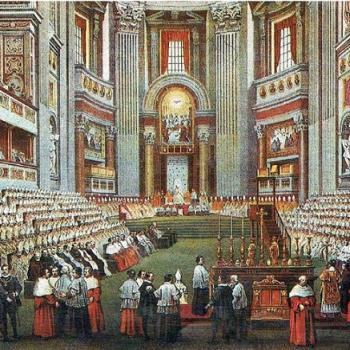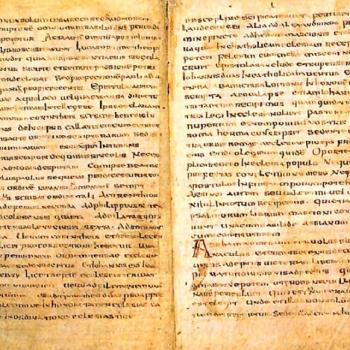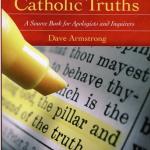
This was a blog dialogue, underneath my post, Baptized for the Dead: THE “UnProtestant” Verse (1 Cor 15:29). My dialogue opponent, Rod Bristol, started making his argument about how Paul supposedly allows all these different doctrines. At length, I discovered that he rejected both original sin and eternal hellfire: thus illustrating perfectly that if one goes down this road of “pluralism” and “secondary doctrines” that one will end up denying clear biblical teachings and Christian orthodoxy. His words will be in blue.
***
Yet another reading of the verse takes note of the fact that St. Paul’s rhetoric is unconventional to most people. Here and elsewhere he argues motivationally, not necessarily logically, from familiar concepts. His reference to a familiar idea does not imply his approval of it. 1 Corinthians 10:1–5 is a clear example of fiction employed in service of truth. “For I do not want you to be unaware, brothers, that our fathers were all under the cloud, and all passed through the sea, and all were baptized into Moses in the cloud and in the sea, and all ate the same spiritual food, and all drank the same spiritual drink. For they drank from the spiritual Rock that followed them, and the Rock was Christ. Nevertheless, with most of them God was not pleased, for they were overthrown in the wilderness.”
The commonality of water in cloud, sea, and baptism helps Jew and gentile Christians identify themselves as one people, sharing a common relationship to God. No one was baptized into Moses, except in this retrospective figure of speech, linking Jew and gentile Christians, who all were baptized into Christ, of whom Moses was a type. So far, the passage makes perfect, allegorical sense. Then the rhetoric turns to a strange idea that may not be obvious on first reading. The Bible tells of two times water burst forth from a rock: at the beginning (Exodus 17:6) and end (Numbers 20:8–13) of the forty years of wilderness wanderings of the Israelites.
To answer the question of what they drank between the two episodes, later story-tellers came up with the idea that a miraculous rock followed the people throughout the forty years. (Targum Pseudo-Jonathon Numbers 21:19) This story was familiar to Jews in the first century, so Paul used it, without explaining it was fiction. The story forges another link between Jews and Gentiles by associating the miraculous water and manna in the desert with Jesus, who gives living water and declares his flesh to be food better than manna, and his blood real drink. By calling it “the spiritual Rock,” Paul obviously means the picture should be understood figuratively.
Very interesting. I think here, though, the analogy is pretty clear:
pray for the dead, because they are raised (2 Macc 12:44)
do penance (baptism of fire) for the dead, because they are raised (1 Cor 15:29)
Paul acknowledged that some are “baptized” for the dead, but he neither critiques nor advocates the practice. He references the practice in the third person, “they,” where a “you” or “we” would indicate it was normative. As you pointed out, the reference to the practice motivates belief in the resurrection. Paul was not the perfectionist in doctrine that many wish him to be; his doctrine focused on the Christ and the implications of the crucifixion and resurrection.
He would not quibble over religious practices that were compatible with the matters “of first importance.” In Romans 14 and in 1 Corinthians 8 – 15 Paul advocates mutual acceptance among people of different religious opinions and preferences. Reading Romans 15:29 as an instance of accommodating divergent ideas seems much less strained than following St. Francis de Sales. The text gives no reason to read “baptism” allegorically.
Romans 14 is about eating beliefs / habits and observances of holidays: hardly doctrinal matters. It’s practices as opposed to doctrine.
1 Corinthians 8 is also about food. Ch. 9 is about the rights of religious workers (but Paul — being Paul — renounced his, heroically going above and beyond the call of duty: 9:13-18). Ch. 10 is about food and idolatry. He mentions the Eucharist, but that’s not an optional teaching for him: all Christians must believe it. Ch. 11 is about gender and the Eucharist: not the slightest hint of variable eucharistic beliefs, as in Protestantism.
In chapters 12-14 he talks about how God gives folks different spiritual gifts, as He wills. Of course He does. Ch. 15 is about the general resurrection. Again, there is not a hint of differential beliefs. Paul passes along what is Christian / biblical / Catholic teaching.
I don’t see what you see at all (“Paul was not the perfectionist in doctrine that many wish him to be”). In doctrinal matters, Paul everywhere assumes that there is one body of apostolic tradition that he has merely passed along, and has no right to modify.
St. Paul and the New Testament as a whole teach this, with a casual assumption that the doctrinal corpus is whole and known and that it can’t be changed, and doesn’t include optional parts. And he certainly knows nothing whatsoever of denominations. For him there is one Church and one set of apostolic / Christian theological doctrines to be believed. Period.
Hence, it uses the following terms essentially synonymously:
the faith
the truth
the commandment
the doctrine
the teaching
the gospel
the tradition
the message
the word of God
The notion of primary and secondary doctrines (the latter being entirely optional) is purely an invention of men; a Protestant tradition, and not to be found in Scripture at all (at least I’ve never seen it). Many practices are permissibly different, as you note, but that’s not doctrine.
So, do you suggest that baptism (not actual baptism, but “affliction” and prayer) for the dead is a doctrine, required of Christians?
Paul explicitly says his teaching does not depend on apostolic tradition. “For I would have you know, brothers, that the gospel that was preached by me is not man’s gospel. For I did not receive it from any man, nor was I taught it, but I received it through a revelation of Jesus Christ.” (Galatians 1:11–12) He elaborates his position relative to other apostles in Galatians 2:6-14.
Paul also explicitly says that some things are more important (1 Corinthians 15:3). Those things are the essential truth of what God has done in the Son. Yes, they are variously titled “the faith…the word of God,” etc., as you have indicated. Too much blood has been shed over differences about what is and is not apostolic doctrine. Romans 14 and 15, along with 1 Corinthians 8 and following, address how to pursue peace when one person’s opinion conflicts with another’s conviction. With the benefit of a more complete body of teaching than the original hearers of those texts had previously received, we may easily dismiss their specific issues of conflict, but they were matters of profound importance to many of the time.
As with prayer, the Church can’t force folks to pray, or to do penance, for those alive or dead; but of course it is highly urged and is a pious and desirable practice.
Paul was instructed to receive instruction from Ananias. Then he sought instruction from Peter and other leaders of the Church. He appears to be a marginal figure at best even in the council of Jerusalem. Peter and James are the key named figures. Then Paul went out and proclaimed the council decision as binding on all believers (Acts 16:4). Paul wasn’t some “lone ranger apostle.” But we’re all over the ballpark. You seem to want to talk about Paul. The topic is 1 Corinthians 15:29 and what it means. For that topic, see my paper: Dialogue with a Calvinist: Was Paul a “Lone Ranger”?
I see in looking over some of your past comments [via Disqus], that you deny original sin:
Such terms as The Fall, fallenness, fallen world, and Adamic nature appear in sermons and conversations, but nowhere in the biblical text. The allegory of Genesis 3 pictures, not a fall, but a maturing, . . . The sin that Jesus came to save us from is our own, not Adam’s. The Bible is true, but our creeds need work. [link]
Original sin is taught in Scripture:
1 Corinthians 15:21-22 (RSV) For as by a man came death, by a man has come also the resurrection of the dead.
[22] For as in Adam all die, so also in Christ shall all be made alive.Romans 5:14-19 (NIV) Nevertheless, death reigned from the time of Adam to the time of Moses, even over those who did not sin by breaking a command . . . if the many died by the trespass of the one man [Paul then repeatedly contrasts this universal fall with positive parallelism of the grace available in Christ] . . . the gift of God is not like the result of one man’s sin: The judgment followed one sin and brought condemnation . . . by the trespass of the one man, death reigned through that one man . . . the result of one trespass was condemnation for all men . . . through the disobedience of one man the many were made sinners . . . (cf. 5:20-21)
For more on this, see: Biblical Evidence for Original Sin.
You also deny eternal hellfire:
Punishment of eternal fire is annihilation. The consuming fire and the consuming worm are eternal; the one condemned to destruction is not eternal. [link]
Eternal punishment (hell) is clearly taught in the Bible as well.
***
Photo credit: Saint Paul Writing His Epistles (c. 1618-1620), by Valentin de Boulogne (1591-1632) [public domain / Wikimedia Commons]
***
















